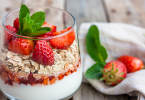Think you know how to diet? Here are some common dieting mistakes and fixes to help you get back on track and shed pounds.
- Skipping breakfast: Skipping meals — especially breakfast — may seem like an easy way to slash calories from your daily intake, but this thinking backfires in a big way. People who skip breakfast overeat and make poorer food choices during the rest of the day. Fast fix: Bypass the high-fat breakfast sandwiches or doughnuts. Opt for whole-grain muffins, crackers, toast or rolls; yogurt and fresh fruit; berries on whole-grain cereal; an egg wrapped in a whole-wheat tortilla; or a fruit smoothie.
- Cutting all carbs: Eliminating an entire food group like carbohydrates from your diet may result in eating too much meat, protein and foods high in saturated fat and cholesterol. Low-carb dieters often eat too few fruits, vegetables and whole grains, missing out on important antioxidants, fiber and other nutrients. Following a low-carbohydrate plan can lead to kidney stones, constipation, diarrhea, dizziness, bad breath, fatigue and nausea. Fast fix: Include healthful carbs in your diet like fresh fruits, vegetables and whole grains, and skip the refined sugars like white breads, pastas and white rice.
- Drinking too many liquids: Because people often mistake thirst for hunger, staying well hydrated is one way to keep overeating in check — but watch those liquid calories. If you’re downing a lot of juice, milk, soda or other beverages each day, you may be consuming far more calories than you think. Fast fix: Water is the best option to meet your daily beverage quota. Try sparkling or flavored water, or squeeze a wedge of lemon, lime or orange into your glass. Choose low-fat or nonfat milk, diet soft drinks and unsweetened teas.
- Shunning snacks: Eating one or more healthy snacks each day can help your weight-loss efforts by keeping hunger and binging under control and providing much-needed nutrients and fiber. Fast fix: Think of your snacks as mini meals and plan them with balance, variety and moderation in mind. Try cut-up raw vegetables or fruit; low-fat yogurt; fat-free pudding; popcorn; pretzels; a sliced apple with a tablespoon of peanut butter; a small baked potato with two tablespoons of low-fat yogurt and Cajun seasoning; or whole-grain crackers, crisp breads or bagels with fresh fruit, hummus or low-fat cheese.
- Sticking with strictly cardio workouts: You may be watching your calories and running regularly, but you’re missing some serious calorie burning if you’re not weight training, too. By training your muscles to become stronger, you build and maintain muscle mass, which helps control body-fat composition and burns more calories — even while at rest. Fast fix: Do strengthening activities such as lifting weights, using resistance bands, doing pushups and situps or heavy gardening or household chores two or three times a week.





